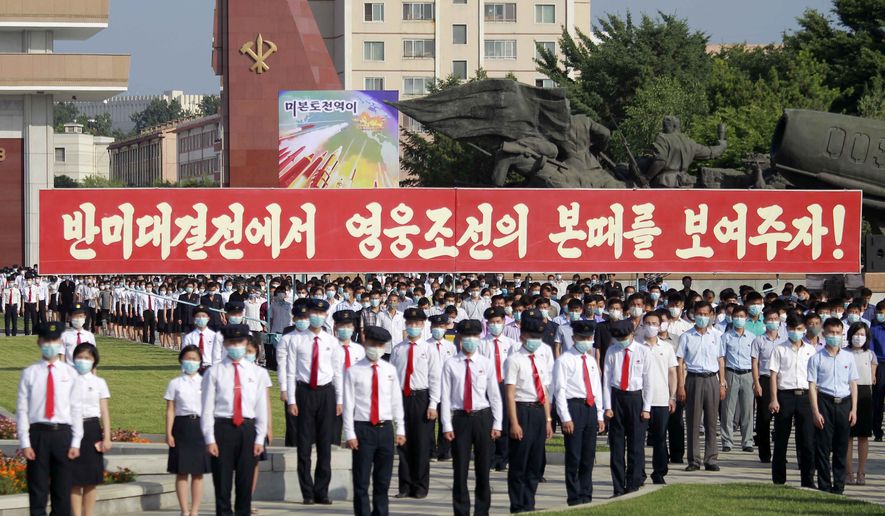OPINION:
June 25th marks the seventy-second anniversary of Pyongyang’s military invasion of South Korea. For North Koreans, June 25th also opens their annual “Hate America Month” which lasts until July 27, the anniversary of the 1953 signing of the Armistice that ended the Korean War. During “Hate America Month” North Koreans elevate their denunciations of the United States for past atrocities and our alleged ongoing “occupation” of South Korea.
Thirty years ago, a high-level delegation of former US government officials, sponsored by the American Freedom Coalition (AFC), were hosted and received in Pyongyang by top Democratic People’s Republic of Korea (DPRK) officials including President Kim Il Sung. Former Missouri Congressman Richard Ichord led the delegation. He met with George H. W. Bush National Security Advisor Brent Scrowcroft before and after the visit. Ichord’s marching orders were to use this visit as a first step towards smoothing relations between Washington and Pyongyang.
The AFC delegation arrived on May 25 and both toured the North and met numerous key DPRK officials. We finally met with Chairman Kim Il Sung himself on June 1. Kim posed for a photo with each of us and hosted a luncheon where, with great charm, he shared the challenges and achievements of the DPRK. The massive round table where we sat with him for lunch comfortably accommodated some sixty attendees including DPRK officials and the entire AFC delegation.
Our delegation had decided in advance that, at the luncheon, Congressman Ichord would be our designated and sole spokesperson. After the luncheon, many felt that we had made a mistake and that it would have been beneficial for Chairman Kim to hear from the other members of the delegation including former U.S. Ambassador to Japan and Assistant Secretary of State for Legislative Affairs Douglas MacArthur II, as well as former U.S. Ambassador to Singapore John Holdridge, who had served as Assistant Secretary of State for East Asian and Pacific Affairs and, under Secretary of State Henry Kissinger, had played a key role in the re-establishment of US-China relations.
Congressman Ichord felt that there should be a document memorializing the AFC visit and outlining the next steps in Washington-Pyongyang relations. The following morning, on the tarmac, as we prepared to take leave from Pyongyang, Congressman Ichord unexpectedly turned to me and told me that the “Mission was not accomplished.” In front of Kim Il Sung’s personal interpreter, he asked me to remain in Pyongyang and work on a joint statement.
I remained in Pyongyang for five more days. Although we reached no consensus on the text that I had helped to craft, I was given assurances that President Kim Il Sung had “something” in the works.
On June 23, 1992, I received a call in my New York office from Ambassador Ho Jong of the DPRK Mission to the United Nations. He invited Congressman Ichord and me to meet him the next day. In our June 24 meeting, the official informed us that, for the first time since the end of the Korean War, the DPRK would suspend its annual “Hate America” month.
The DPRK representative explained that he had been directed to convey this decision to us rather than use official channels because Reverend Moon’s organizations, rather than traditional channels, had played the pivotal role that led to this conciliatory gesture by Pyongyang. He requested that Congressman Ichord himself convey Chairman Kim’s decision to the White House, which Ichord did when he met General Scowcroft on June 25 and this was followed up later with a meeting with President George H. W. Bush.
Ambassador Ho pointed to the Washington Times as a key reason for this decision. As a follow-up to the visit of Rev. Sun Myung Moon and his wife, Dr. Hak Ja Han Moon to Pyongyang at the end of 1991, the Washington Times sent Josette Shiner, one of its top journalists to interview Kim Il Sung in April 1992. Chairman Kim expressed appreciation that the Times had published his words rather than “explain” them. Ambassador Ho also expressed how much Chairman Kim appreciated that the American Freedom Coalition (AFC), founded by the Moon in 1988, had sponsored such a high-ranking delegation of former US officials to visit Pyongyang.
Since her husband’s passing in 2012, Dr. Hak Ja Han Moon has continued the efforts, which led him to create the Washington Times in 1982 and to remain committed to its important work until today. Like him, Dr. Moon harbors great appreciation for the Pax Americana which, in the Post-World War II period, facilitated the birth of democracy and rule of law in Tokyo and in Seoul. Ongoing saber-rattling in Northeast Asia nonetheless reminds us that the American presence is still required and that the Washington Times plays a key role in informing the region’s quest for genuine peace.
- Thomas J. Ward is Distinguished Dean Emeritus of the University of Bridgeport’s College of Public & International Affairs and Professor of Peace and Development Studies at Unification Theological Seminary (UTS) in New York City.




Please read our comment policy before commenting.